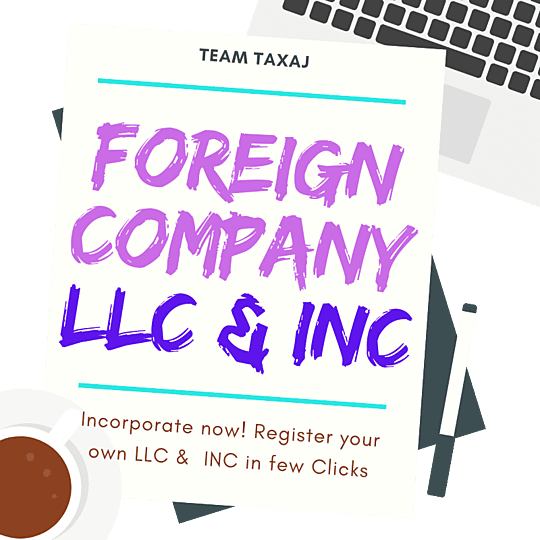Foreign Company Registration - Outside India

For Indian businesses seeking expansion or having a non-resident Indian consumer demand, stand an excellent opportunity to reap the many benefits of USA company registration, one of the most popular ways of starting a business. Setting up a US company for your business is now easier than ever. The United States of America, harboring a multicultural population, has a large English-speaking populace and is mainly open to foreign companies due to its diversity. Dominant as the world’s top superpower with an economy that is fourteen times larger than India, it provides one of the most accommodating turfs for Indian businesses to flourish quickly. What are you planning to do with your company? Are you going to receive any outside funding from VC or angels? If you do not plan on bringing on investors in the future, I will choose an LLC. If you wish to bring on investors, I will choose a corporation. What are you planning to do with your company? Are you going to receive any outside funding from VC or angels? If you do not plan on bringing on investors in the future, I will choose an LLC. If you wish to bring on investors, I will choose a corporation.
We found a way for you to set up your US bank account remotely through our banking partner. It operates as a US bank, has more benefits for startups, and is more convenient for foreign-owned businesses.
There are no minimum balances, opening fees or monthly fees. There is a cost for wire transfers which are $5 domestically and $35 internationally. There are no limits to the balance you can have in your account, and there are no limits to the number of transactions you can make out of your checking account. Outgoing US wire transfers have a limit of up to $500K, whereas outgoing international wire transfers have up to $300K. Outgoing linked bank transfers have a limit of up to $500,000, and remote check deposits limit up to $200,000. Yearly charges would depend on whether you set up in Delaware or Wyoming. For Delaware, you will have to pay the registered agent fee and franchise tax which can vary based on the nature of your business. You will also need to pay for your US-based address if your company is formed in Delaware. We will cover the first month for you. The address for Wyoming companies will be provided by the registered agent and is free. Yearly charges would depend on whether you set up in Delaware or Wyoming. For Delaware, you will have to pay the registered agent fee and franchise tax which can vary based on the nature of your business. You will also need to pay for your US-based address if your company is formed in Delaware. We will cover the first month for you. The address for Wyoming companies will be provided by the registered agent and is free.
Get your foreign company registered anywhere in the world in the fastest possible manner.
It normally takes us 20 business days to get everything done for you. If you have an SSN or a TIN, the process takes 2-4 business days.
1. State filing fees
2. Company formation
3. Obtaining EIN (Tax ID for the company)
4. Post-Incorporation set up
5. A business bank account with our partner, which is set up remotely so you do not need to visit US
6. One-time free tax consultation
7. Special offers and discounts from our partners
8. Lifetime support from us.
- Businesses looking to expand or scale operations on higher level
DSC Application
Name approval form filing
Preparation of Incorporation Documents
Getting those docs signed by the respective stakeholders
Filing of e-Forms
Receipt of Incorporation Certificate.
Name, Contact Number and Email Id of all the Stakeholders.
Directors Identification Number, if already.
Self Attested PAN, Aadhar & Passport size photo of all the Stakeholders.
Latest Month Personal Bank statement of all the Stakeholders.
Specimen Signatures of all Stakeholders.
Few Proposed Business Names along with Objects.
Brief description of main business activities of the proposed Company.
Shareholding pattern (50:50 or 60:40) between the Stakeholders.
Authorised & Paid Up Share Capital of the Company.
Launch your Business anywhere in the world!
Benefits of having Company in a Foreign Country
Benefits of having Company in a Foreign Country

Advantages of Limited Liability Company
Limited Liability Corporation is the best choice for many businesses. It offers extensive growth possibilities, poses a minimal risk with no shareholders limit and gives extra credibility for your company incorporated. Moreover, when you incorporate an LLC, taxes are not be paid on the trade profits at the legal entity stage. Instead, the taxes from the company’s profits is filed on the proprietors’ tax returns.
Advantages of C Corporation
C corporation is advantageous to foreign businesses because of the multiple tax planning opportunities. You also get the free transferability of shares and legal protection with no limits on the number of shareholders or owners. Although in C corporation, the profits are always taxed at the legal entity level. For example, suppose the profits and the business's resources are split among the stakeholders as a bonus. In that case, the stakeholders are entitled to pay their corporate income tax dues on the profits, thus creating a double taxation scenario.
Why USA company registration is beneficial?
In the USA, business laws and regulations are well-formed, and corporate income tax rates are meagre. It is highly favourable for foreign businesses to thrive efficiently. However, every state is governed by its state laws and regulations in the USA, which vastly differs. If your business is state-dependent, it is wise to Incorporate your business, thereby acquiring a Foreign Qualification Certificate. Nevertheless, Delaware, Wyoming and Nevada provide the most complimenting business and relaxing tax laws, which makes it mainstream for companies to choose this state to incorporate. In particular, Delaware is said to be tax heaven as they have no state sales tax, and the state’s franchise tax for small US & foreign businesses is very meagre. Additionally, there is no need for non-residents & Foreigners to pay separate corporate income tax in Delaware.
Top 5 Benefits of USA Company Registration
👉 Business-friendly laws and regulations
👉 Personal assets such as house or savings are protected from risks
👉 Low Corporate income tax rates
👉 The business is incorporated quickly in the US when done in Delaware, Wyoming and Nevada
👉 Publicly revealing names of directors and shareholders of your US company is not required
How to choose & Set up the Right Company Structure in the US?
There are mainly two main categories of incorporation to choose from, LLC and C-Corporation. However, LLC is preferred the most because of its ease towards single taxation and adaptability. On the other hand, budding entrepreneurs who appeal to venture capitalists and angel investors to raise funds must incorporate as a C-Corp and not an LLC. Also, if you are planning to go public, C-corp would be the ideal choice to make.
Following are the documents that must be submitted in any of the languages Dutch, English, German or French:
LLC C Corp The owners are the members The owners here are the Shareholders Appropriate for small-scale businesses with limited shareholders Apt for middle-size to substantially sizeable businesses with many shareholders Members can set up the structure as they choose and manage Shareholders elect directors who manage business movements Members are not held liable in an LLC Shareholders are not held liable in a C corp Depending on the limitations of the operating agreement, transferability is planned Here the stock of shares can be transferred easily In general, stakeholders from outside don’t prefer an LLC because they are structured to operate as partnerships mostly Foreign investors prefer C corp because they contain stocks, which is distributed among the shareholders
| LLC | C Corp |
|---|---|
| The owners are the members | The owners here are the Shareholders |
| Appropriate for small-scale businesses with limited shareholders | Apt for middle-size to substantially sizeable businesses with many shareholders |
| Members can set up the structure as they choose and manage | Shareholders elect directors who manage business movements |
| Members are not held liable in an LLC | Shareholders are not held liable in a C corp |
| Depending on the limitations of the operating agreement, transferability is planned | Here the stock of shares can be transferred easily |
| In general, stakeholders from outside don’t prefer an LLC because they are structured to operate as partnerships mostly | Foreign investors prefer C corp because they contain stocks, which is distributed among the shareholders |

